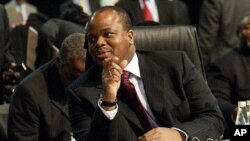South Africa has agreed to loan $350 million to the government of Swaziland to prevent a potential collapse of the country's economy. However, the decision has been criticized by Swazi activists.
The Swaziland Solidarity Network (SSN) has condemned the loan to Swaziland, saying that South Africa should have demanded political and economic reform as a prerequisite.
The decision has also angered the Congress of South African Trade Unions and the South African Communist Party. They, like the SSN's Lucky Lukhele, say the funding will mainly benefit Swaziland's King Mswati III.
"This money basically is just going straight into the overballooning family and himself - half of it. I can assure you in six months to come the king will be crawling, creeping off in the middle of the night to his personal friend, President Jacob Zuma, for another bailout," Lukhele said.
However, the assistance will require Swaziland to implement both governance and fiscal reforms.
South African Finance Minister Pravin Gordhan made it plain that, in addition to fiscal reforms, the government of Swaziland will have to address major deficiencies in the way it runs the country.
"Whilst the fiscal reforms are the primary objective of some of the agreements reached between the kingdom of Swaziland and the IMF - we believe that these must be anchored in governance reforms in Swaziland, decided upon and led by the Swazi people themselves," said Gordhan.
South Africa will transfer the funding to the Central Bank of Swaziland in three installments, with the first third to be paid as soon as the agreements have been signed. This will be followed by equal payments in October and in February next year.
Under the terms of the agreement, the government of Swaziland has agreed to a set of objectives to promote economic and social development, democracy, human rights and good governance, as well as developing a strong civil society.
Swaziland must also comply with fiscal reforms recommended by the International Monetary Fund, which will be monitored by a task team from the World Bank, the IMF, the South African National Treasury and the African Development Bank.
South Africa will also work with Swaziland to build governance and fiscal capacity.
Swaziland was getting half its budget from the Southern Africa Customs Union, SACU. But that revenue declined by 60 percent due to the global recession and because of a new revenue-sharing system that was implemented last year, which Swaziland failed to factor into its budget, despite years of warning.
Previously, South Africa shared customs revenue under a formula that gave poorer neighboring countries far more money than they would have earned on their own.
Swaziland is a monarchy ruled by King Mswati III. Elections are held for the House of Assembly but voting is done on a non-party basis.
For several years there has been growing demand to allow multiparty democracy in Swaziland and for reform of the monarchy. King Mswati, who has been on the throne since 1986, is widely criticized for a lavish lifestyle. He has 13 wives, each with a palace, and he has several luxury vehicles and a personal aircraft.
Even though he controls two trust funds said to be worth $100 million, the state funds King Mswati's upkeep to the tune of some $57 million per year.
Activists Condemn South Africa Loan to Swaziland




